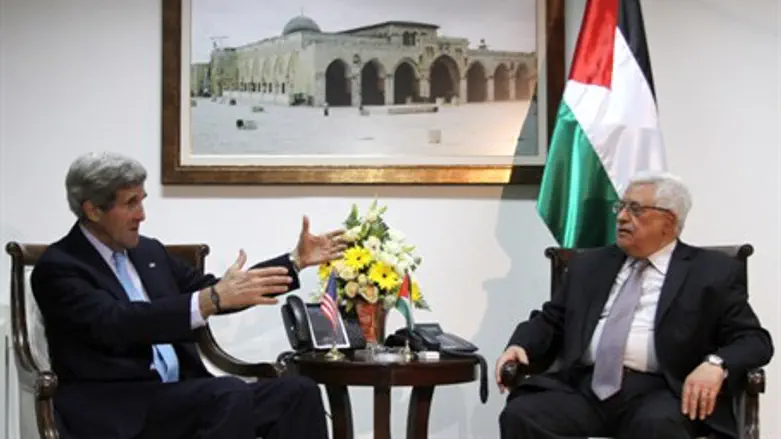
U.S. Secretary of State John Kerry met Palestinian Authority (PA) Chairman Mahmoud Abbas in Wednesday, in a bid to save the peace talks, AFP reported.
Flying in to Jordan from an interrupted visit to Rome, he first held talks with King Abdullah II as he pressed his bid to "continue to narrow the gaps" between the two sides, his spokeswoman said.
He and his team then went into talks over dinner with Abbas who had just returned from the Arab League's annual summit in Kuwait.
The talks stretched late into the night and only ended after more than four hours, a U.S. official said. Neither side made any immediate comment after the meeting, according to AFP.
Kerry’s meeting with Abbas, which was not planned until Tuesday night, was suddenly announced hours after the PA Chairman launched a tirade against Israel at the Arab League summit, accusing the Jewish state of being responsible for the peace talks not progressing.
Abbas and the PA won key backing Wednesday from the Arab League for their refusal to bow to Prime Minister Binyamin Netanyahu's demand to recognize Israel as a Jewish state.
"We express our total rejection of the call to consider Israel as a Jewish state," an Arab League declaration said at the end of the two-day summit.
Kerry, who coaxed the two sides back to the negotiations last July after a three-year freeze, is aiming to reach a framework to guide the talks going forward as an April 29 deadline for a deal looms.
But Abbas has told him he will not discuss the framework accord until after Israel releases the fourth batch of terrorists it agreed to release as a “gesture” to Abbas.
The PA chief negotiator, Saeb Erekat, admitted earlier this month that Abbas was staying in talks solely for the sake of the terrorist releases. In the wake of these statement, government ministers have been pressuring Prime Minister Binyamin Netanyahu not to go through with the fourth release.
On Wednesday, hundreds of victims of terrorism and their supporters demonstrated outside the Prime Minister's residence in Jerusalem, against the impending release of the final batch of 104 convicted terrorists.
Many of the demonstrators were family members of victims of terrorism, who expressed their personal anguish at the prospect of the killers going free and urged the government to make good on its threats to prevent the release.
